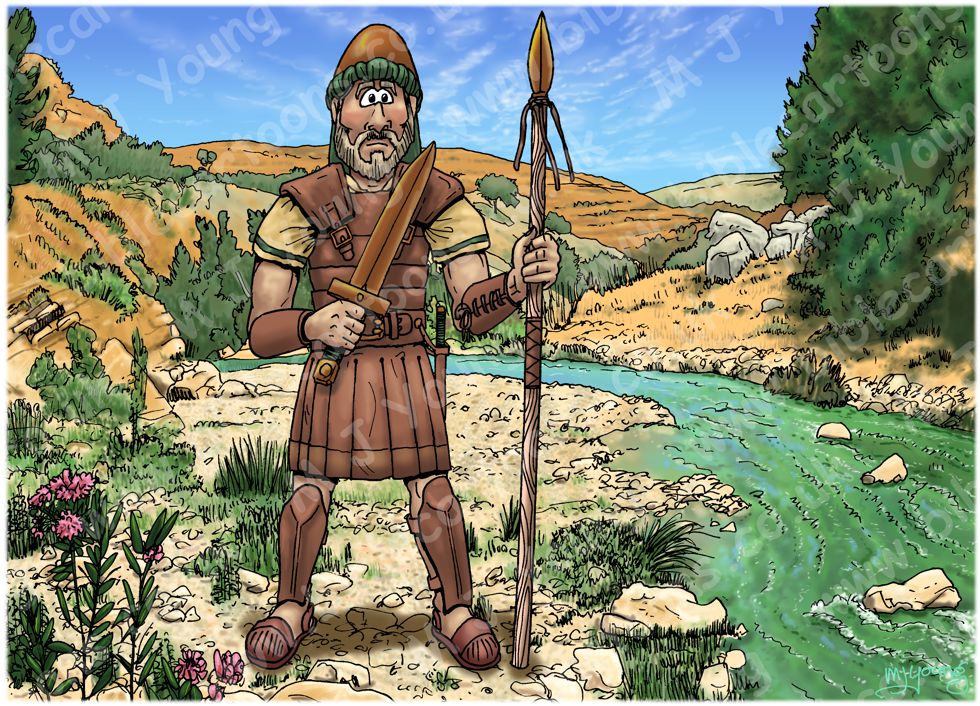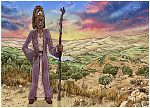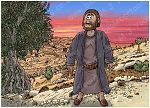Bible Cartoon: Judges 11 - Jephthah, Israel’s eighth judge
Click on Add to cart button below shopping cart.
Purchased Bible Cartoons do not have watermarks. Links to Cartoons provided on email once purchase is completed.Bible Book: Judges
Bible Book Code: 0701100101
Scene no: of
Bible Reference & Cartoon Description
Judges 11:1 (ANIV)
Jephthah the Gileadite was a mighty warrior. His father was Gilead; his mother was a prostitute. [1]
[1]
The Hebrew word (transliteration) ish-shaw’; is the feminine version of the Hebrew words for man or husband; i.e. a woman, or a wife. Her nature, moral standing or occupation is not explicitly defined by this word. In a similar way, the Hebrew word zonah (not used in the passage above), which some commentators render as harlot, should be translated a hostess, a keeper of an inn or tavern for the accommodation of travellers. (As is contended for on Joshua 2:1).
DRAWING NOTES:
TIME OF DAY:
Unspecified in the Bible narrative. I have set the scene in the early afternoon.
LIGHTING NOTES:
The sun (unseen & high in the sky) illuminates this scene, casting shadows below the figure & other objects.
CHARACTERS PRESENT:
Jephthah the Gileadite.
RESEARCH/ADDITIONAL NOTES:
The name Jephthah translates to “opened,” or “opener,” probably signifying “Yahweh will open” or “whom, or what God sets free”.
As the name in verse 1 above suggests, the eighth judge Jephthah was from the region of Gilead. He is described as a mighty warrior, so I have drawn him in leather armour, with a bronze sword & helmet.
Jephtheh is standing on the rocky shore of the Jabbok river.
Here’s the landscape without the figure.

Background of Judges 11 – Jephthah, Israel’s eighth judge
Click on the colour bar below to view/buy this Background:
Background of Judges 11 Jephthah, Israel’s eighth judge

Map - The 12 Judges home towns or locations
Click yellow bar below to see Maps: The 12 Judges home towns and locations, with download & purchase options:
Map – The 12 Judges home towns or locations
Gilead
The name Gilead is explained in Genesis 31:45-47 [2], as derived from Hebrew gal, “a cairn,” and ‘edh, “witness,” agreeing in meaning with the Aramaic yegharsahadhutha’. The Arabic jilead means “rough,” “rugged.”
“The mountain region east of the Jordan, called “the hill country of Gilead” (Genesis 31:25), extending from the Sea of Galilee to the upper end of the Dead Sea, about sixty miles long and twenty wide, bounded on the north by Bashan and on the south by Moab and Ammon (Genesis 31:21; Deut. 3:12-17), now called Jebel Jelâd or Jelûd. Upon it is the site of the ancient city of Ramoth-gilead, now identified by Nelson Glueck with Tell Ramith in the northern part of the country. Its scenery is beautiful; the hills are fertile and crowned with forests. Scripture names oak trees and herds of cattle as being found there (Genesis 37:25; Numbers 32:1). Reuben and Gad desired to possess this territory because of their need of pasture for their herds (Deut. 3:12-17). The name Gilead is seldom used in the Bible beyond OT history.”
[Source: New Unger’s Bible Dictionary]
“A mountainous region bounded on the west by the Jordan, on the north by Bashan, on the east by the Arabian plateau, and on the south by Moab and Ammon. Gene 31:21; Deut 3:12-17 It is sometimes called “Mount Gilead,” Gene 31:25 sometimes “the land of Gilead,” Numb 32:1 and sometimes simply “Gilead.” Psal 60:7; Gene 37:25 The name Gilead, as is usual in Palestine, describes the physical aspect of the country: it signifies “a hard rocky region.” The mountains of Gilead, including Pisgah, Abarim and Peor, have a real elevation of from 2000 to 3000 feet; but their apparent elevation on the western side is much greater, owing to the depression of the Jordan valley, which averages about 3000 feet. Their outline is singularly uniform, resembling a massive wall running along the horizon. Gilead was specially noted for its balm collected from “balm of Gilead” trees, and worth twice its weight in silver.”
[Source: Smith’s Bible Dictionary”]
[2]
Genesis 31:45-47 (NLT)
45 So Jacob took a stone and set it up as a monument. 46 He also told his men to gather stones and pile them up in a heap. Jacob and Laban then sat down beside the pile of stones to share a meal. 47 They named it “Witness Pile,” which is Jegar-sahadutha in Laban’s language and Galeed in Jacob’s.
Bible Doctrine Notes
11:1-7 HUMANITY, Human Nature (2.42A)
Prejudice causes people to reject each other for the wrong reasons. The Hebrew word for “hate” has its root meaning in rejection. The act of rejecting someone deprives the community of the contributions, gifts and strengths of the person or people despised. The community is then unable to assimilate the rejected people’s gifts and talents into the whole.





